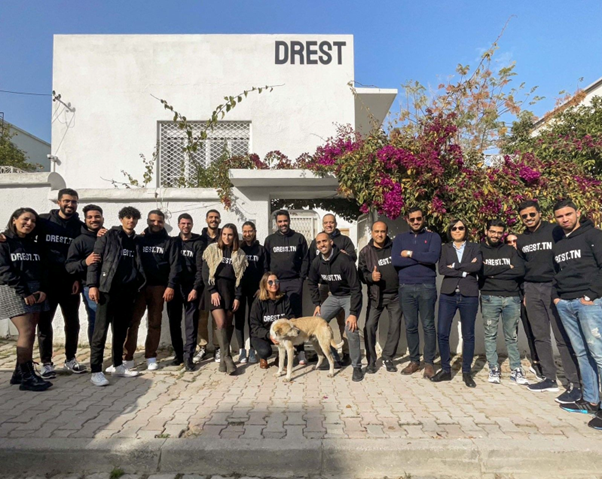
Dhekra Khelifi, Founder Partner of 216 Capital@216 Capital
Tell us about your fund, 216 Capital
It's a seed fund that caters to a very local need. Startups that have managed to raise funds in foreign currencies since 2013 (Editor's note: implementation of the Startup Act) have done so with foreign funds. We want to intervene at this level. At this pre-seed stage to help them go international. We want to be the fund that aligns with African entrepreneurs who are disrupting the African continent.
Tell us about your recent operations: Overall, what drives your investments? What is your strategy?

We started investing in August 2022, through a fund of 10 million euros. Thanks to this innovation in Tunisian regulation, we can invest in foreign currencies. We are addressing this issue. The average ticket size is around 250,000 euros. We don't necessarily focus on the sector, but we are very focused on technology. We have made investments in very diverse sectors, in e-health, logistics, fintech, energy... The last two operations were carried out in Senegalese startups Logidoo and ProXalys. Since August 2022, we have been able to invest in 15 startups from different countries, but also in the diaspora, African project holders. We have funded their startups to help them establish themselves on the continent. In total, we have invested 3 million euros in these 15 startups.
Our vision is to position ourselves as a player in early-stage financing for these African project holders and the diaspora and to develop local tech ecosystems. To do this, we have co-invested with Moroccan, Senegalese funds, and why not tomorrow with Algerian and others…
What will the African tech ecosystem look like? You are thus a player in the Tunisian tech ecosystem. How is it evolving?
The Tunisian tech ecosystem shows success stories. For Tunisia, with a little perspective, it took some time, but there is success, like that of Instadeep, and others, startups are standing out not just through branding but through very successful financial operations. This means that things are working. If I had to brand Tunisia, I would put this inexhaustible talent pool first. Minds are designed like that, in tech, analytics. Moreover, the private universities developing in Tunisia are mostly in tech to meet students' choice to orient themselves towards technological training. When you have a good talent pool, there is a great probability of having people who will turn to entrepreneurship and who have the ability and talent to create solutions. Just look at the statistics: in 90% of startups in Tunisia, it is the CTOs who are leading the way.
Since 2013 and the Startup Act, we haven't just had a law, but behind it, all the mechanisms of the ecosystem are supported: incubators, coworking spaces, and increasingly decentralized, not limited to Tunis, we have an extraordinary ecosystem in Sousse, in Sfax, all very specialized. Unfortunately, the limits remain in the regulations, with a country that remains very bureaucratic and mechanisms dating back to the 90s, even 80s. They do not advance at the same pace. This is a real challenge for a startup. The other being the market. A country of 12 million inhabitants... But precisely, those that succeed do not do B2C but B2B, that's where Tunisian startups should focus.
More generally, how is tech made in Africa doing?

Overall in Africa, we have many startups in the early stage, but in Nigeria, Kenya, South Africa, and Egypt: The Big4, countries more advanced than other ecosystems. In general, we have to wait a few more years to see other ecosystems catch up with their delay, but something very interesting is happening: companies have understood that they have to go out and explore other neighboring ecosystems. What is happening in Ghana, Rwanda where ecosystems are emerging. This needs to be encouraged through financing in particular. Africa's challenge is to have its own technological infrastructure, its data centers, and others, a prerequisite. The second thing is to consider that we are in a continent where it is possible to find opportunities within this immense territory.
As an investor, what is the trend: there is a global decline in investments in the global tech, and likewise in Africa after record years. How will things evolve, and what role can African funds like 216 CAPITAL play in better supporting this ecosystem?
Our role, clearly, the solution is precisely to have local investments. Africa is a continent. We should not expect a very large African investor but have consortiums of African investors. It's something I dream of, a somewhat magical solution, but the trend is moving towards that. This will allow us not to be completely isolated from what is happening elsewhere. Venture capital has its ups and downs, it follows trends that are not controlled locally, as a continent, we do not control these trends, we undergo them. In Africa, we have our own events, our timeline, but financing that comes mostly from outside does not follow this timeline, it comes when it wants and leaves when it wants. If we carefully observe what happened in 2023, we indeed see a 28% decrease in African tech. 400 funded startups is 50% less than the previous year. This is very revealing. Investors, who are not African, came, looked around, bet on a trend, when this financing winter arrived, they said Africa can wait. What does this create in Africa? Something disruptive for an early-stage ecosystem. 80% of funded startups are in the early stage. When funding stops, the risk is to kill these ecosystems. On the other hand, those who gave these positive signals are the 50% local, who invested in the 400 funded startups. We must not break away from what is happening in the world but with an ecosystem composed mostly of Africans and therefore no followers, we control our agenda. Hence our desire to increase co-investment, with African funds, their focus is Africa. My mission is Africa. This is what we should align with and these are the statistics we should look at.




